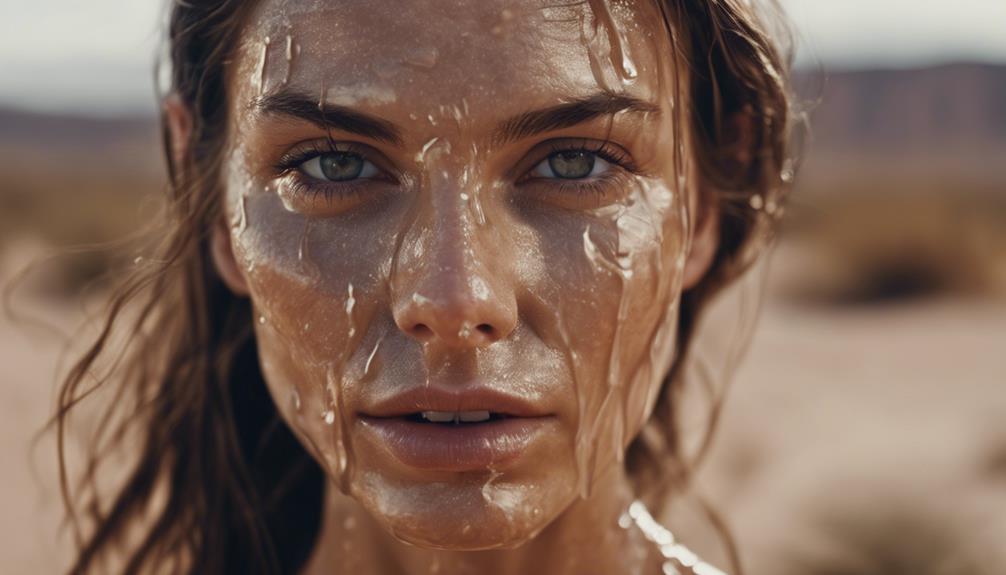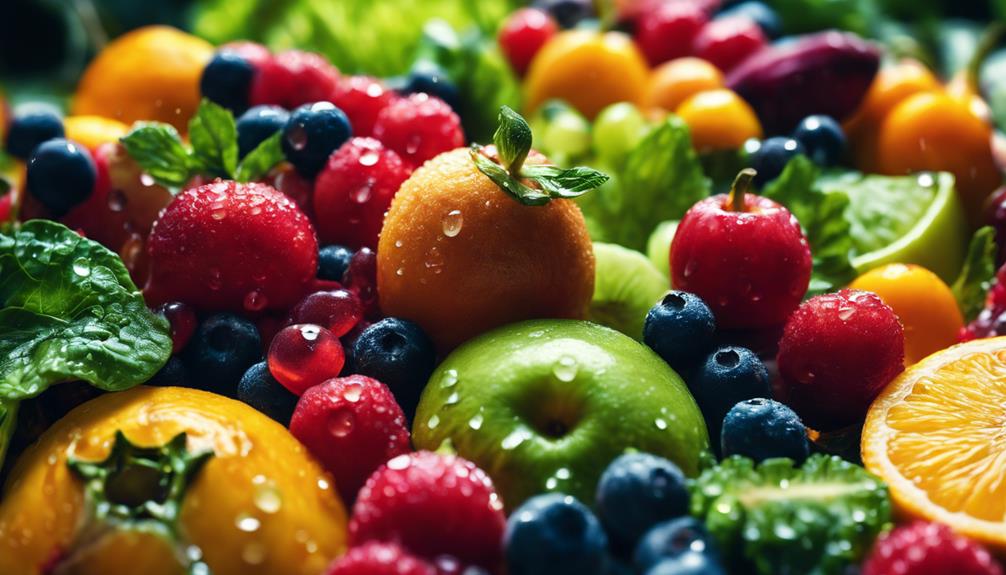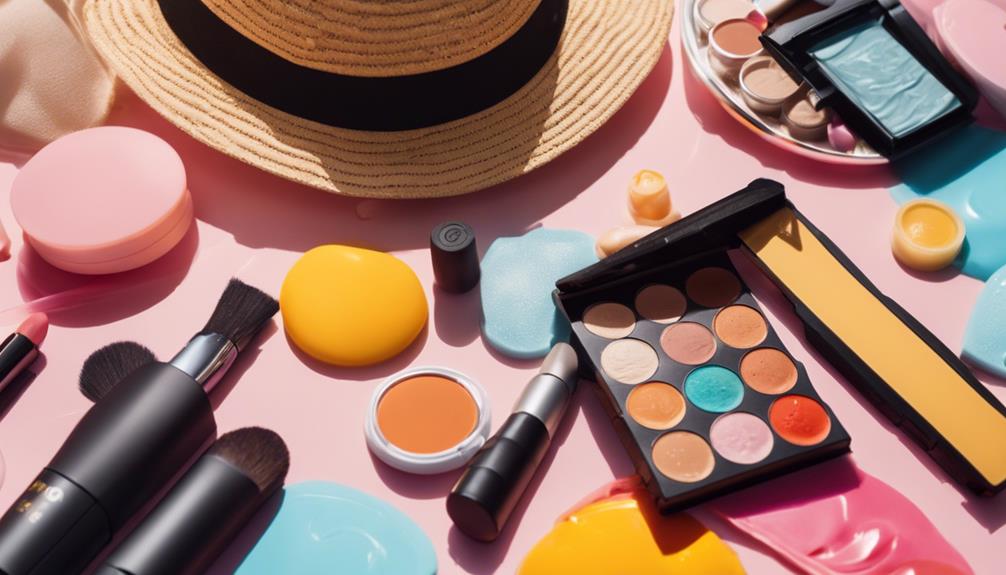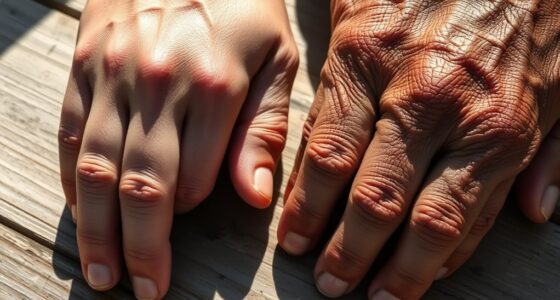Water alone can't hydrate your skin; it can actually strip away essential natural oils. This leads to dryness and irritation, counteracting any benefits you might expect. Proper skin hydration requires a mix of internal and topical methods, including a balanced diet and quality skincare products. Hydrating serums and mists can provide a moisture boost, helping to retain skin hydration more effectively. Remember, your skin needs more than just water to stay healthy and vibrant. Stick around to discover how to enhance your hydration routine and achieve that glowing skin you're after!
Key Takeaways
- Drinking water alone does not ensure hydrated skin; a balanced diet and topical products are essential for effective hydration.
- Over-cleansing with water can strip the skin of its natural oils, leading to increased dryness and irritation.
- The skin's lipid barrier plays a crucial role in retaining moisture and preventing dehydration.
- Hydrating products like serums and mists are vital for enhancing skin hydration beyond just drinking water.
The Truth About Water
When it comes to skin hydration, many people mistakenly believe that simply drinking more water will solve their problems. While adequate water intake is essential for overall health, it doesn't directly translate to hydrated skin. The body prioritizes distributing water to important organs, meaning that even if you increase your water intake, your skin might still end up dehydrated.
Your hydration needs vary based on factors like age, activity level, and environment. It's important to recognize that hydration isn't just about drinking water; it also involves consuming water-rich foods. In fact, about 20% of your daily fluid intake comes from food sources.
Topical hydration plays a significant role in maintaining skin moisture. The outer layer of your skin, the stratum corneum, can absorb water but doesn't retain it from external sources like swimming pools. Many motivating myths suggest that drinking large amounts of water can eradicate skin issues, but true skin hydration requires a blend of internal hydration and effective moisturizers.
Understanding these nuances can help you combat dehydrated skin more effectively.
Water Strips Natural Oils

When you wash your skin, you mightn't realize that water can strip away its natural oils.
This oil barrier is essential for keeping your skin hydrated and protected from irritants.
Over-cleansing can disrupt this balance and leave your skin feeling tight and dry.
Skin's Natural Oil Barrier
The skin's natural oil barrier is vital for keeping moisture in, but excessive cleansing can strip these significant oils away, leading to dryness and dehydration. This barrier, primarily made up of lipids, prevents water loss and maintains hydration levels. When you wash your face too often or use harsh soaps, you risk damaging this protective layer, which makes your skin more susceptible to dehydration.
To guarantee your skin stays healthy, focus on a gentle cleansing routine and incorporate hydrating products into your skincare regimen. Here's a quick overview of the key components for maintaining your skin's natural oil barrier and hydration:
| Aspect | Importance | Recommendations |
|---|---|---|
| Natural Oil Barrier | Locks in moisture | Use gentle cleansers |
| Hydration | Prevents dehydration | Increase water consumption |
| Skincare Routine | Supports skin's health | Include occlusive moisturizers |
Over-Cleansing Effects Explained
Over-cleansing strips your skin of essential natural oils, leading to dryness and a compromised barrier that struggles to retain moisture. When you wash your skin too often or use harsh soaps, the natural oils that keep your skin hydrated are removed. Hot water can exacerbate this effect, leaving your skin feeling tight and uncomfortable.
The stratum corneum, the outermost layer of your skin, is designed to prevent water loss. However, over-cleansing disrupts this function, resulting in dehydrated skin that may flake and irritate easily. If you find yourself washing your face multiple times a day or using strong cleansers, you might notice increased dryness and a lack of hydration.
To maintain ideal moisture levels, stick to mild, soap-free cleansers that respect your skin's natural oils. After cleansing, make sure to moisturize promptly to lock in hydration.
Alternatives for Skin Hydration

Exploring alternatives for skin hydration can reveal effective ways to achieve a plump and radiant complexion. One great option is to incorporate hydrating mists into your routine. These mists often contain humectants like hyaluronic acid, which mimic natural moisturizing factors in your skin, providing instant hydration.
Applying a serum with glycerin or sodium hyaluronate before your moisturizer can amplify skin hydration, ensuring a lasting moisture barrier for up to 24 hours.
Don't overlook the benefits of gel-based masks. Infused with minerals like algins, they deliver deep hydration, especially when you refrigerate them for a revitalizing experience.
Additionally, incorporating water-rich foods, such as fruits and vegetables, into your diet can complement your skincare efforts by contributing to your daily fluid intake.
The Role of Hydrating Mists

Hydrating mists play an essential role in instantly revitalizing your skin while enhancing moisture retention throughout your skincare routine. When you use hydrating mists, they help remove cleansing residues, minerals, salt, and chlorine that can obstruct moisture absorption, ensuring your skin is primed to soak up hydration.
Formulated with humectants like hyaluronic acid, these mists draw in and retain moisture, greatly improving your skin's hydration levels. By mimicking natural moisturizing factors, hydrating mists work to maintain moisture, promoting overall skin health.
Incorporating a hydrating mist into your day can be a quick and convenient way to refresh your complexion. Whether you're at home or on the go, a spritz can provide that much-needed boost.
Using these mists between your cleanser and moisturizer can create a barrier that enhances the effectiveness of your skincare routine, allowing subsequent products to penetrate better.
Serums That Boost Moisture

When it comes to boosting skin moisture, serums are your secret weapon.
Look for key ingredients like hyaluronic acid and glycerin, which can provide deep hydration.
Applying these serums correctly can make all the difference in achieving that radiant glow you want.
Key Serum Ingredients
Serums that boost moisture are packed with powerful ingredients like hyaluronic acid and glycerin, which draw water into your skin for lasting hydration. These key ingredients are known for their ability to enhance moisture retention and improve overall skin texture.
Hyaluronic acid, in particular, can hold up to 1,000 times its weight in water, making it a superstar in hydrating serums.
When you apply a moisturizing serum before your moisturizer, you're setting the stage for considerably better hydration levels. This layering technique allows the serum to penetrate deeper into your skin, delivering essential moisture where it's needed most.
Sodium hyaluronate, a derivative of hyaluronic acid, also plays a significant role due to its smaller molecular weight, enabling deeper absorption for enhanced hydration.
Using an effective hydrating serum helps mimic your skin's natural moisturizing factors, ensuring your skin feels plump and well-hydrated.
By incorporating these serums into your routine, you're not just applying a moisturizer; you're targeting specific moisture needs that improve skin texture and overall hydration.
Application Techniques for Hydration
Applying hydration techniques effectively can maximize the benefits of your moisturizing serums, ensuring your skin stays plump and radiant. To achieve ideal skin hydration, start with damp skin. After cleansing, apply your serum while your skin is still slightly wet. This technique helps attract moisture more efficiently and seals it in for longer-lasting hydration.
Next, follow up with a quality moisturizer to create a barrier that locks in the moisture, preventing moisture loss throughout the day. Regularly using serums rich in ingredients like hyaluronic acid and glycerin can greatly improve your skin's texture and elasticity.
Here's a quick reference guide to help you with your application techniques:
| Step | Technique | Benefits |
|---|---|---|
| Step 1 | Cleanse | Prepares skin for better absorption |
| Step 2 | Apply serum on damp skin | Enhances moisture attraction |
| Step 3 | Use gentle tapping motions | Encourages deeper penetration |
| Step 4 | Follow with a moisturizer | Locks in hydration |
| Step 5 | Reapply throughout the day | Maintains hydration levels |
Benefits of Gel Masks

Gel masks offer a revitalizing way to deliver intense hydration that penetrates deeply into your skin. These gel-based treatments are designed to keep your skin hydrated by enhancing moisture retention, effectively quenching your skin's thirst.
When applied, you'll notice a soothing, cooling effect that can comfort sensitive or irritated areas, making them perfect for any skincare routine. Infused with beneficial minerals like algins, gel masks not only hydrate but also help reduce redness, promoting a more even skin tone.
Using gel masks a few times a week can greatly boost overall skin hydration and improve texture. You'll see your skin feel softer and look more radiant with consistent use.
To amplify the benefits, try refrigerating your gel masks before application. This simple step enhances their cooling effect, providing additional relief and comfort to your skin.
Misconceptions on Water Intake

You might think that drinking eight glasses of water a day is essential for staying hydrated, but that's not the whole story.
Misinterpreting urine color and confusing caffeine's effects on hydration can lead to further misunderstandings.
Let's clear up these misconceptions to help you better understand your hydration needs.
Eight Glasses Myth
The idea that everyone should drink eight glasses of water daily is a myth that overlooks individual hydration needs. Water is essential for your body, but the amount you need varies based on your skin type, activity level, and environment. Instead of fixating on a specific number, focus on listening to your body.
Consider these common myths about hydration:
- You need eight glasses, no exceptions.
- Thirst isn't a reliable indicator of hydration.
- Only water counts towards your daily intake.
- Dark urine always means you're dehydrated.
Drinking enough water is important, but remember, proper hydration can help you maintain healthy skin and overall health. The CDC suggests that men aim for about 125 ounces and women for 91 ounces daily, including moisture from food.
It's essential to balance your intake based on your unique needs. A healthy diet rich in fruits and vegetables can also contribute to your hydration.
Urine Color Misinterpretation
Misunderstandings about urine color can lead to inaccurate assessments of hydration, as many people wrongly equate clear urine with ideal hydration levels.
While light straw-yellow urine generally suggests adequate hydration, it's important to remember that urine color can be affected by medications, foods, and underlying health conditions. This means that dark urine, often viewed as a sign of dehydration, isn't always a definitive indicator. In fact, overhydration can cause health issues, such as electrolyte imbalances.
A 2017 study emphasizes that focusing solely on urine color isn't the best way to determine hydration levels. Instead, it suggests monitoring factors like sodium concentration in your blood, as this provides a more accurate reflection of your fluid balance. Individual variations in hydration needs also matter, so what works for one person may not apply to another.
To achieve prime hydration, consider integrating a variety of methods to assess your hydration status. Pay attention to your body's signals, and remember that urine color is just one piece of a larger puzzle when evaluating your overall hydration and health.
Caffeine Hydration Confusion
Many people believe that caffeine dehydrates the body, but recent research shows that moderate coffee consumption can actually hydrate you just as well as non-caffeinated drinks. This caffeine hydration confusion can leave you questioning your hydration routine. You mightn't need to skip your morning brew to stay hydrated.
Consider these points:
You can enjoy your coffee while getting hydration.
Food, like fruits and veggies, contributes considerably to your daily fluid intake.
The diuretic effect of caffeine is minimal for most people.
Healthy hydration comes from a variety of sources, including topical products.
Listening to your body helps you understand your unique hydration needs.
Signs of Dehydrated Skin

Dehydrated skin shows clear signs like dullness, flakiness, and a rough texture that can make it feel uncomfortable and tight. If you notice these symptoms, it's essential to take action. Dehydrated skin lacks moisture, not oil, making it important to enhance hydration through various methods.
Here's a quick overview of common signs of dehydrated skin:
| Signs | Description | Impact on Skin |
|---|---|---|
| Dullness | Skin appears lifeless and gray | Lacks radiance and glow |
| Flakiness | Visible dry patches on the surface | Can exacerbate rough texture |
| Tightness | Sensation of discomfort or itchiness | Indicates compromised skin barrier |
Environmental factors like pollution and climate can worsen these signs, leading to increased sensitivity and redness. When your skin struggles to maintain moisture balance, fine lines may also appear, making it imperative to regularly assess hydration status. By recognizing these signs, you can take proactive steps to restore your skin's moisture and protect your skin barrier from further damage.
Expert Insights on Hydration

Expert insights highlight that proper hydration goes beyond just drinking water; it requires a multifaceted approach that combines diet and skincare. While staying hydrated is vital for your overall health, your skin needs more than just water to thrive. Dermatologists recommend using topical products like moisturizers containing ingredients such as hyaluronic acid and glycerin to lock in moisture effectively.
Consider these key aspects to enhance your hydration strategy:
- Balanced Diet: Nutrients like omega-3 fatty acids support skin health.
- Hydrating Foods: Fruits and vegetables can boost your hydration considerably.
- Collagen Support: Consuming collagen-rich foods can improve skin elasticity.
- Consistent Moisturization: Regular use of moisturizers maintains skin moisture levels.
It's essential to remember that everyone's skin responds differently to hydration based on genetics and lifestyle factors. By integrating a well-rounded diet and effective skincare routine, you can achieve ideal skin health and maintain that radiant glow you desire.
The Impact of Lifestyle Choices

Your lifestyle choices play a considerable role in how well your skin retains moisture and maintains its overall appearance. If you indulge in excessive alcohol or smoke, you're likely exacerbating dehydration, which can severely impact skin moisture levels. High-stress situations also contribute, as they elevate cortisol production, leading to dry and sensitive skin.
Moreover, poor dietary habits can hinder your hydration levels. If you're not consuming enough water-rich foods, your skin may struggle to maintain its moisture balance and elasticity. Lack of sleep further disrupts your body's hydration regulation, leaving your skin looking dull and dehydrated.
Environmental factors, like exposure to dry air or pollution, can worsen the effects of dehydration on your skin. To combat these issues, focus on making healthier lifestyle choices. Stay hydrated, eat a balanced diet rich in fruits and vegetables, manage your stress, and prioritize sleep.
Frequently Asked Questions
Does Water Actually Dehydrate You?
Water doesn't dehydrate you; it's essential for your overall health. However, excessive intake can lead to imbalances. Focus on balanced hydration and consider external factors affecting skin health for ideal results.
Does Drinking Water Actually Hydrate Skin?
Did you know that nearly 75% of your skin's moisture comes from topical products? While drinking water's important for overall health, it doesn't directly hydrate your skin. A complete skincare routine is essential for ideal hydration.
Does Water Dry up Your Skin?
Yes, water can dry up your skin if you're exposed to it too long, especially in harsh environments. To maintain moisture, you should combine drinking water with effective moisturizers and protect your skin from dryness.
How Long Does It Take to Rehydrate Skin by Drinking Water?
Drinking water can take several days to visibly rehydrate your skin. Consistent hydration, along with a good skincare routine, helps improve moisture retention, but individual factors like genetics and environment also play a key role.
Is Sweat Beneficial for Hydrating the Skin Despite the Myth of Water Dehydration?
During the hot summer months, many people believe that sweat can dehydrate the skin, but in reality, summer sweat and skin care can actually be beneficial. Sweat helps to naturally moisturize the skin and regulate body temperature. Just be sure to cleanse the sweat off the skin to prevent clogged pores and potential breakouts.
Conclusion
To sum up, while water is essential for overall health, it mightn't be your skin's best friend when it comes to hydration.
Consider Sarah, who switched from plain water to a hydrating serum and noticed a remarkable improvement in her skin's texture and moisture levels.
By focusing on the right products and lifestyle choices, you can achieve that radiant glow without relying solely on water.
Remember, your skin craves more than just H2O!









